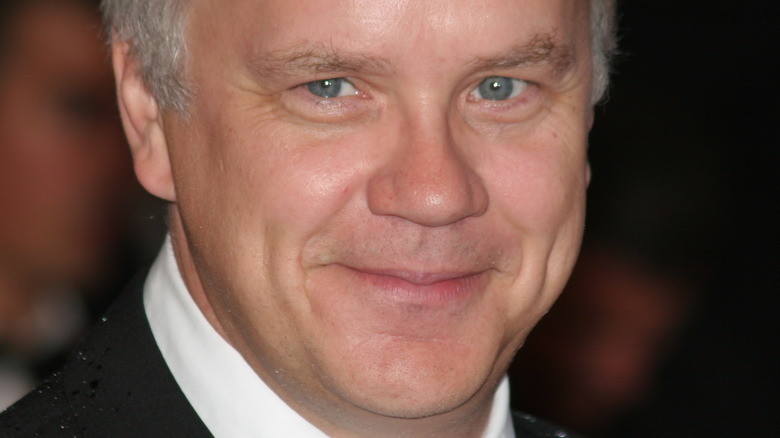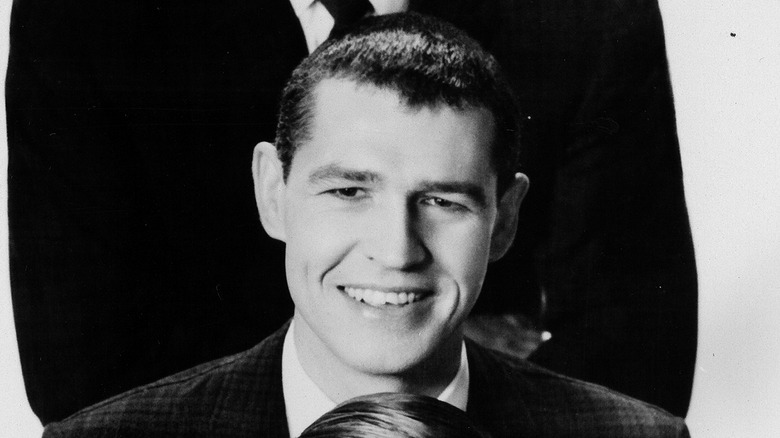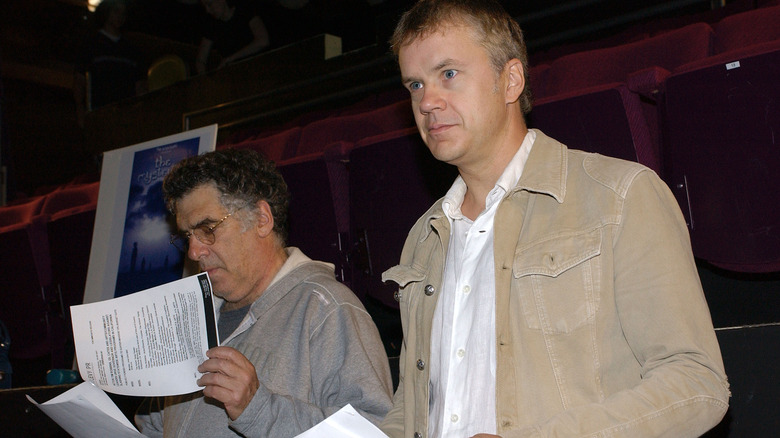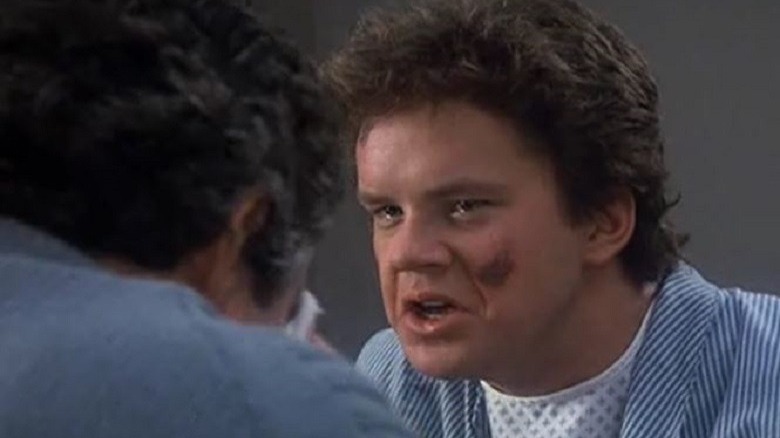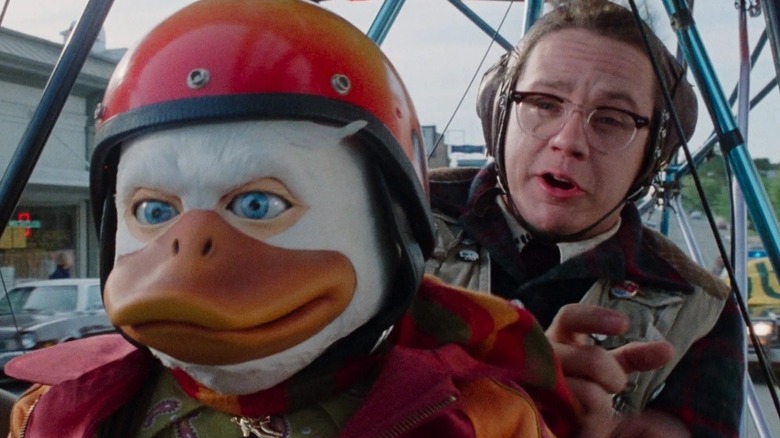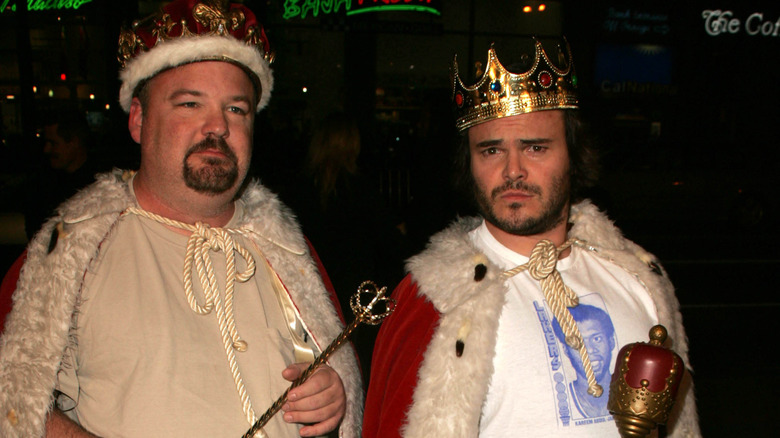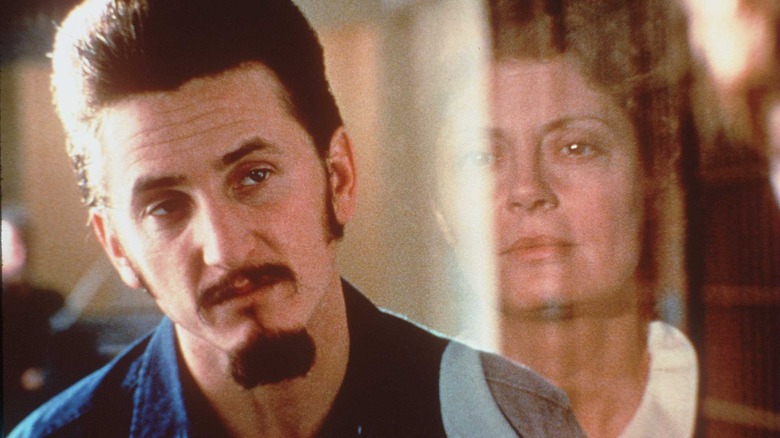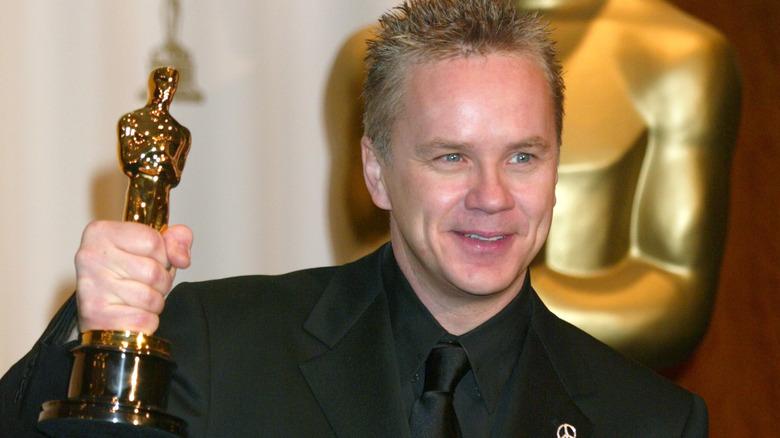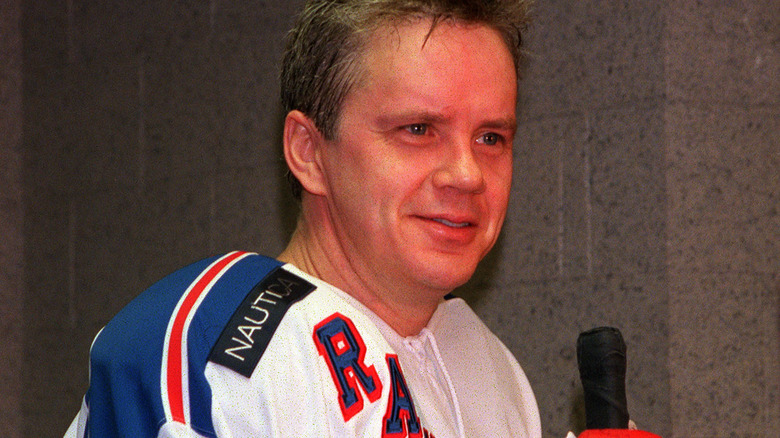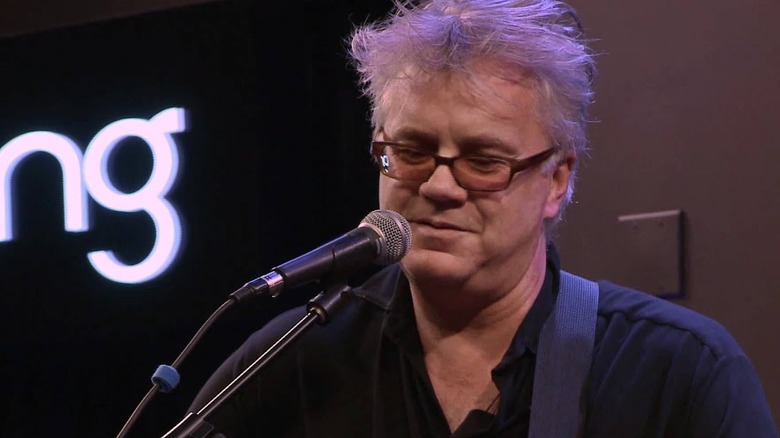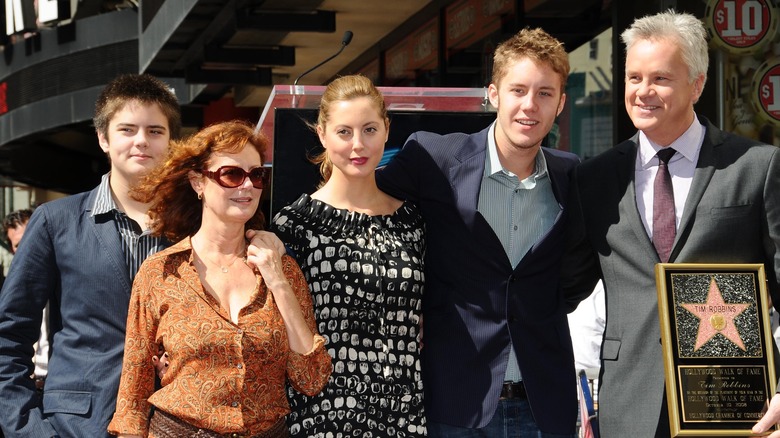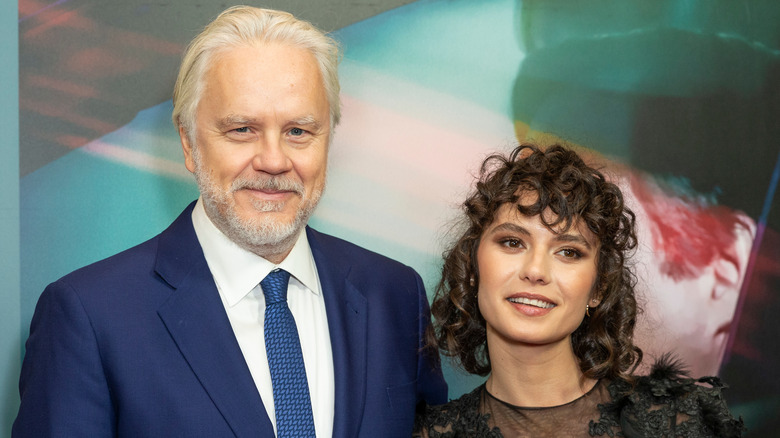The Untold Truth Of Tim Robbins
Tim Robbins has had a long and prolific acting career on both the stage and screen that goes back to the early 1980s. He got his start in the theater in New York City before moving to California and eventually landing his earliest screen credits. He's appeared in a variety of different genres of film, and has proven that his talents stretch from the silliest of comedies to the most serious of dramas and everything in between. In addition, he occasionally ventures behind the screen or curtain to write, direct, and/or produce projects as well. He has directed three theatrical films, one TV movie, and multiple episodes of various television shows — as well as the work he's done in the theater as both an actor and director.
Though there are things about Robbins's personal life that are common knowledge — such as his decades-long relationship with fellow actor Susan Sarandon as well as his willingness to speak openly and candidly about his political opinions — he is a relatively private person who prefers to keep as much of his life out of the public consciousness as possible. Of course, being a celebrity always makes that difficult, but he's still managed to keep much of his personal life out of the public eye for a good stretch of his career.
With that in mind, almost any details about his life and career that go beyond the obvious can be considered "little known" facts, and most of the things on this list will be a surprise to even those who count themselves as big fans of the actor, writer, director, musician, and sometimes athlete.
His father and brother are both accomplished musicians
Tim Robbins isn't the only creative person in his family. He not only comes from a talented father, but that father passed his proclivities down to both his son Tim as well as his son David. Gil Robbins was an influential folk musician who was a member of the band The Highwaymen (not the country supergroup with Johnny Cash, Willie Nelson, Waylon Jennings, and Kris Kristofferson). The group had a #1 hit in 1961 with their version of "Michael Row Your Boat Ashore," and the New York Times called Gil "a fixture on the folk-music scene" after his passing in 2011 at age 80, for both his music career and for managing a popular folk music club in New York City. Less than two weeks later, Tim's mother, Mary — also a musician — passed away as well.
As for David Robbins, he definitely caught the music bug from his parents. David is a composer with over 40 credits to his name, scoring all three of his brother's theatrical directorial efforts and his HBO series "The Brink." But David doesn't only work on his brother's stuff, as he also composed, produced, and/or arranged music for movies like "Gattaca," "Boys Don't Cry," "King of California," and "War, Inc." As for the next generation, Tim's son, Miles, is also a musician who plays in a band called the Pow Wow Family Band — though he performs under the name and persona of "Millie" (per the Los Angeles Times).
He co-founded The Actors' Gang, which launched several major careers
Shortly after he finished college, Tim Robbins decided to get together with some of his school pals and form a theater group. That group, called The Actors' Gang, quickly established a knack for finding and developing future stars. Among its ranks have been Jon Favreau, John Cusack, Helen Hunt, John C. Reilly, Jeremy Piven, Kate Walsh, and Fisher Stevens, along with many others. Several Actors' Gang members would go on to frequently work together in movies, including Robbins and Cusack as well as Cusack and Piven. There is another major A-lister that was in the group, but we'll save that one for later as they deserve their own entry for reasons that'll make sense when you get there.
Despite Robbins having so much success in Hollywood shortly after the founding of the group, The Actors' Gang not only remains active to this day, but Robbins is still a part of it. For instance, in 2014, Robbins directed a version of William Shakespeare's "A Midsummer Night's Dream" that toured all around the world, to countries that included China, Brazil, and Italy. Robbins is so committed to The Actors' Gang and live theater in general, in fact, that the group even put on virtual performances during the pandemic (per LAist).
He made his screen debut on St. Elsewhere
Other than audiences who were able to see Robbins's early theater career in college and beyond, most people didn't really become aware of him until he started appearing in movies in the mid-1980s. However, a few years before his breakthrough role in "Bull Durham" — plus his brief appearance in a little movie called "Top Gun" — Robbins made his screen debut on television. Near the beginning of its run, Robbins played a character named Andrew Reinhardt across three episodes of the pioneering medical drama "St. Elsewhere." It's a show that would launch the careers of several future stars, including Denzel Washington, Mark Harmon, Howie Mandel, and David Morse, to name a few.
"St. Elsewhere" isn't the only TV that Robbins did in those early years, either. During that decade, he also showed up in a single episode each of "Moonlighting," "Hill Street Blues," "Amazing Stories," and "The Love Boat." However, other than "Saturday Night Live" and "The Simpsons," Robbins would sit out television for the entire span of the 1990s. He returned to the small screen in 2003 with an appearance in the star-studded PBS miniseries "Freedom: A History of Us." In 2011, he turned up in the HBO movie "Cinema Verite," a film about the early history of what would become known as reality television.
He thought Howard the Duck would be a huge hit
Tim Robbins was still very much an up-and-comer when he took on a role in the ill-fated 1986 "Howard the Duck" movie, basically the first major Marvel film adaptation. Whether you consider it a crime against cinema, or you are among those who have come to view it as a cult classic, it's an objectively bizarre movie and the live-action actors who showed up and took it seriously deserve a lot of credit. Robbins was one such actor, having less to lose than Lea Thompson — who already had "Back to the Future" under her belt and its sequels around the corner — but still taking a gamble on a movie that ended up bombing so badly it's a wonder anyone attached to it came out unscathed.
In an interview with Yahoo, Robbins did admit that the paycheck was his main reason for taking the role, since he was still something of a struggling actor at the time. However, the actor also confessed that he felt the movie seemed like an interesting idea at the time, and given the connection with George Lucas (who produced), he believed that the movie was going to be a big hit. Well, it wasn't — quite the opposite, in fact. But Robbins's career was just fine, and in looking back now, he isn't embarrassed about having it in his filmography.
He's indirectly responsible for the band Tenacious D
As mentioned in a previous entry, Tim Robbins has a group of friends that he makes a lot of movies with, many of whom were in his Actors' Gang. One of those people is Jack Black, who scored his first-ever film role when his buddy Robbins put Black in his 1992 film "Bob Roberts." Robbins would again cast Black in the other two theatrical films he wrote and directed, "Dead Man Walking" and "Cradle Will Rock."
But Robbins did more than just help Black's acting career. He is also more or less responsible for his musical career as well, as Kyle Gass was also part of The Actors' Gang and that is where he met Black in 1990. Four years later, the pair would form Tenacious D, a comedic rock duo that has not only released several albums and embarked on multiple tours but also had an HBO series and theatrical film. Tenacious D has long been just as big a part of Black's career as acting, and he — and the band's millions of fans — have Robbins to thank for introducing Black to his musical soulmate.
He was nominated for a Best Director Oscar for Dead Man Walking
Tim Robbins has only directed three theatrically-released feature films and one TV movie — plus some TV episodes, music videos, and documentaries — but he established himself as a talented filmmaker very quickly. His directorial debut, "Bob Roberts" (which he also wrote and starred in), was critically acclaimed, not to mention one of the earliest indicators of how outspoken Robbins was going to be about politics throughout his career.
Sophomore effort "Dead Man Walking" was not only equally acclaimed but racked up a few Academy Award nominations. Most notably, it earned his then-partner, Susan Sarandon, her first and so far only Oscar, winning for Best Actress. It would also be the first Best Actor nomination for Sean Penn, and the second Best Original Song nomination for Bruce Springsteen (though both would lose). However, it is sometimes forgotten that Robbins also got a nomination for Best Director for "Dead Man Walking," especially since Mel Gibson winning for "Braveheart" was huge news and overshadowed any of the other nominees in the category that year.
He prefers to edit his films literally by hand
It might not come as a big surprise that Tim Robbins is a bit "old school," and prefers to do a lot of things that old-fashioned way. By his own admission — in an interview he did with Pearl Jam frontman Eddie Vedder – he is something of a Luddite in multiple ways, such as his preference for vinyl albums over CDs or digital music. While speaking with Vedder, Robbins also went on to explain other ways in which his resistance to technology plays into his filmmaking.
Robbins told Vedder that, with three of the four films he had done by that point, he did the editing by hand — literally cutting and splicing film, the way they did it before digital video and computers got involved in the process. However, he also admitted that he was doing it at least partly on principle and to prove a point, saying, "I think I'm finally going to admit that I have to edit on computers the next film I do, just because it seems like there's a point of being right, and then at some point you're just a fool."
He claims to be the tallest Oscar winner ever
Full disclosure: There's a bit of contention on this one. While on "Late Night with Conan O'Brien," Tim Robbins once claimed to be the tallest Oscar winner in history. At an imposing 6 feet, 5 inches, it's a claim that is pretty easy to accept as fact. However, a Google search on the tallest Oscar winner will yield several other possible holders of that crown, including James Cromwell, John Wayne, and a few more.
Trying to pin down the exact height of actors isn't very easy to begin with, with different sources claiming different things. Ultimately, only a person's doctor and/or their tailor probably know for sure how tall they actually, truly are. But Tim Robbins claims the title of tallest Oscar winner and is seemingly the only person to do so himself, so there really isn't much reason not to just let him have the distinction.
He's an avid hockey player and diehard Rangers fan
While many celebrities are fans of basketball, baseball, or football, and are often seen at games, it's a bit more rare to find one that is a huge hockey fan. But Tim Robbins certainly is, describing himself as a lifelong fan of the NHL team the New York Rangers. He's also long been a hockey player himself, not only playing in high school but also in various celebrity charity hockey games (per The Hockey News).
At one point, Robbins was involved in a weekly roller hockey game in New York City's Greenwich Village neighborhood, a tradition that stretched back 20 years. The roster rotated often but brought together celebrities, doctors, musicians, and more and had long been a fixture in the area. That is, until police shut it down in 2013 after people complained about the danger of getting hit by flying pucks (per the New York Post). Robbins's reaction to the development: "I think it's terrible," adding that the idea of a common space where people from different walks of life could come together was supposed to be what the city was all about.
He formed a band called The Rogues Gallery Band
Apparently, it wasn't just Tim Robbins's brother, David, who inherited musical talents from their father. Tim is also a gifted musician and songwriter, something he first demonstrated in a big way when he wrote multiple songs for his character in "Bob Roberts." He also contributed music to some of his other projects, but it wasn't until his split from Susan Sarandon that Robbins finally decided he had something to say and contribute as a full-fledged musician.
In the late 2000s, he formed Tim Robbins and the Rogues Gallery Band, a folk music outfit that began playing shows around that time and would eventually release an album. The band was largely active around 2010 and for a few years after, but there's never been any official announcement about it being disbanded or Robbins being done with music — so there's every possibility that Tim Robbins the musician may still record or perform more music at some point.
Susan Sarandon says he was jealous of her relationship with their sons
Though they never got married, Tim Robbins and Susan Sarandon were long considered one of the most stable couples in Hollywood. They met while filming "Bull Durham" and were together for 23 years before finally calling it quits in 2011. Both Robbins and Sarandon are fairly private people, and they've both credited that privacy as a key factor in the success of their relationship while it lasted. But ultimately, they wouldn't end up being partners for life — and all we really have as to a reason are brief mentions and vague statements from both parties.
For Sarandon's part, she suggests that one of their issues as they started having problems was that Robbins was jealous of her relationship with their sons. According to Sarandon, Robbins was never close with his mother, and so seeing Sarandon and their sons have a tight bond "drove him crazy." Jealousy of any kind has always been one of the surest things to erode a relationship, and it's not hard to imagine that this at least exacerbated whatever other issues the couple may have been experiencing in the home stretch of their partnership.
The public didn't know he was married until after he got divorced
Just how private is Tim Robbins? Apparently, he's so private that he can have an entire marriage start and end before anyone even knows a thing about it. That is what happened when, in January of 2021, TMZ discovered divorce filings between Robbins and actress Gratiela Brancusi (per Vanity Fair). What made this so surprising is that nobody even knew Robbins and Brancusi were married, and neither had ever publicly confirmed that they were romantically involved at all.
While the two did start popping up in various places in early 2018 and were seen together multiple times, there was never any kind of official announcement from the couple or anyone else as to the nature of their relationship. TMZ's report was the one, single thing that finally outed them — and after their marriage was over, no less.
